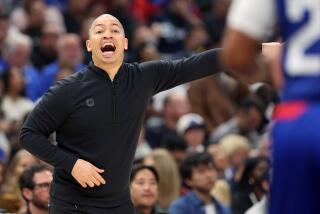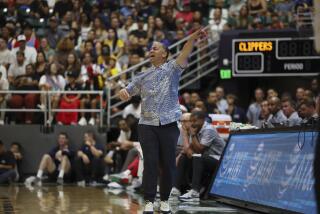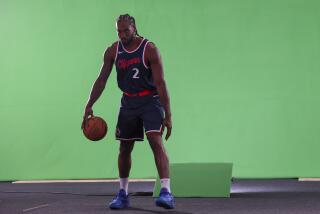Hungry for Success : Sure, Everyone Has a Favorite Stanley Roberts Joke, but He Is Working Hard and Hopes to Have Last Laugh by Making an Impact With the Clippers
No, it’s not true that Stanley Roberts, 7-foot junk-food junkie, has eaten everything but his words, that he has swallowed everything but his pride. Or that he is an animal lover who never turns away from dogs--corn or hot. Or that when friends stop by to chew the fat, he does.
But Pat Williams, his general manager in Orlando, once said, “No man is an island . . . but Stanley comes close.” And, “Stanley Roberts’ idea of a balanced meal is a Big Mac in each hand.”
And Matt Guokas, his coach with the Magic, remarked a year ago, “I’ve seen a lot of guys come to camp in my 26 years in the NBA, but none have been this bad out of shape.”
Roberts has gone steady with corn dogs, hamburgers, hot dogs, pizzas and 2 a.m. meals for a couple of summers and paid for it with his reputation. And paid for it, period, by falling to 23rd in the 1991 draft, much lower than an in-shape Roberts would have gone. That cost him money.
Now, in this fall of 1992, having been traded by Orlando, he is a Clipper, the 22-year-old starting center for the team that passed on him in the draft, in part because he reminded them too much of Benoit Benjamin.
He has a five-year contract worth $17.2 million--up from $15.16 million after the trade automatically
triggered a 15% bonus--and a lot more to prove.
Says who?
Says Stanley Roberts.
“I’ve been known as a game player, not a practice player,” he said. “That’s one thing I’m trying to change right now. You talk to a lot of scouts and it’s like, ‘Oh, he’s great in games. But in practice, he doesn’t work as hard as he should.’ That’s one of the things I’m trying to turn around. I realize in the past I wasn’t doing all I could do in practice to be the best I could be. This year, talking to Elgin and Coach Brown, that’s something I need, and I realize it.”
Said Elgin Baylor, the Clipper general manager: “He’s right about that. Some people are not convinced. They are convinced he can play in this league, but can he be consistent?”
Roberts reported to the Magic’s camp last year at 317 pounds. When he got into shape and trimmed down to 293, he averaged 15.5 points and 8.1 rebounds in his final 24 games before suffering an ankle injury. He arrived at Clipper camp weighing about 310.
“I wasn’t working out like I should have,” he said. “My father died. I was home for a while with my mother. I just had a lot of things going on. Then the trade came, and I wasn’t working out. Mostly it’s my fault.”
Talent has never been much of a question. He didn’t play basketball until 10th grade, but within three years, as a senior at Lower Richland High in Hopkins, S.C., he was one of the most highly regarded players in the country. He played one season at Louisiana State, had double-figure rebounds in 16 of 32 games and was named third-team All-Southeastern Conference. His lone NBA season produced second-team all-rookie honors.
So when he begins his first season as a Clipper tonight, he is a promising player in more ways than one.
“All I ask for is a chance to go out there and prove myself and show them what I can do,” Roberts said of Los Angeles fans. “After that, I think they’ll pretty much fall in love with me and appreciate me.”
Roberts grew up in Hopkins, not far from the state capital of Columbia, and was, to use his description, a momma’s boy who figured he would end up as a “regular ol’ Joe with a regular job, working 9 to 5.” His appreciation for food began when he was 10, when he would fill in as family cook for his mother who was working the night shift as a custodial supervisor at the University of South Carolina.
By junior high, despite remaining responsible at home, he was cutting classes regularly, and basketball was no more a part of his life than meetings of the honor-roll society.
His older brother, Wayne, played, and a cousin who lived next door, David Williams, was an all-state guard. Roberts, though, had no interest in the game. But he was tall--6 feet in the seventh grade and 6-5 by the eighth--so he was supposed to play.
“It’s strange for me because I never really wanted to get into the sport,” he said. “It was kind of forced on me.”
Said his high school coach, Jim Childers: “That’s the most accurate statement he’s ever made.”
Childers, having heard of Roberts from the cousin and older brother, came calling before Roberts began ninth grade. Stanley responded by attending the nearby Alex English basketball camp with the rest of the Lower Richland players and proving that his non-interest in basketball was not merely talk. He showed a remarkable lack of skill and conditioning.
It was not unusual for him to be so out of a play that he would reach the offensive end just in time to see a fast break blow past him the other way. Every now and then he might luck out and be in the right place at the right time.
Roberts was spared his freshman high school year because he was academically ineligible. Then in the summer before 10th grade, he had grown to 6-9 and was showing obvious signs of improvement. He went back to the Alex English camp and blocked shots. He took down rebounds and dribbled downcourt a bit. He was even involved in fast breaks.
That was the start of a speedy ascent. Roberts went from 6-9 that summer to 6-10 by the end of his sophomore year, to 6-11 as a junior, to 7 feet as a senior and at a relatively svelte 265-270 pounds. His skill level rose in kind.
But, even as the awards and praise poured in, most of the satisfaction came in a roundabout way.
“At first, it was easy to motivate him to do things because it was new to him,” Childers said. “But as he got better, he received more attention, and I think he liked that attention. It was attention he wasn’t shown before, and that motivated him. You wouldn’t believe the support he was shown around Columbia. . . . A lot of his motivation comes in that he was pleasing other people. He likes to play for the crowd. Not so much for himself, but he likes to please other people by playing basketball.”
On to LSU. A Prop. 48 casualty as a freshman because of grades below the NCAA-mandated level, he averaged 14.1 points and 9.8 rebounds and shot 57.6% in 1989-90 and decided to skip the NBA draft to return for his junior year. But when more academic problems surfaced in summer school, Roberts decided to leave school for the pros.
Except that, because the draft had passed, the only option was to go overseas. This big man, who really was still a boy, was suddenly in Spain, playing with Real Madrid, and his weight problems were beginning.
He was an NBA first-round pick in waiting, playing against a lot of players who would have struggled in the Southeastern Conference, and still Roberts averaged only 8.7 rebounds per game. And that wasn’t the worst of it. The dispatches being sent back to the United States dwelt on his poor effort and conditioning. The Clippers sent their European scout, Bill Banks, to Spain for a look and got a similar report.
That was enough to scare them off at draft time. Picking 22nd, the Clippers took LeRon Ellis, who barely played and was not re-signed for a second season. Roberts went next to the Magic, played a season and then fell to second string the instant Orlando won the lottery and the rights to Shaquille O’Neal, Roberts’ former LSU teammate.
The Clippers--having traded Olden Polynice, having been told by Charles Smith that he did not want to play center and having decided not to re-sign James Edwards--got interested.
“I spent hours talking with Stanley,” Baylor said. “We discussed his weight, his desire, giving the effort, working hard, about how people are going to respond to him. Because right away, they’re looking at him as another Benoit. He isn’t another Benoit. He’s a young player, and I think he should be given an opportunity.”
So, just as the Magic did, the Clippers will hook up Roberts--who does not have a weight clause in his contract--with a nutritionist to have each of his meals specially prepared. And then hope for the best.
“I don’t worry about what people say, but I’m concerned about what they do,” Coach Larry Brown said. “Every day he’s gotten better. Instead of getting tired of it and slacking off, he’s improved every day. Morning workouts, in all our regular practice sessions, in weightlifting, he’s been responsible in every single thing we’ve done. I think a lot of it is what he’s done; the fact that he’s not just saying, he is doing it.
“From what I’ve seen so far in my association with him, he’s real good, he’s real positive. He’s got a great temperament. Nobody really likes training camp. I’m aware of that. But he comes to practice every day and tries to get better. And that’s all I asked him to do when we initially got started.”
So far so good. Roberts’ weight has dropped to the mid-290s, about 10 more than his goal. But the Clippers, citing feedback from nutritionists and doctors who measured his fat content, say he could be very successful without even dipping into the 280s.
Some teams play the waiting game. The Clippers play a weighting game.
Comparisons to Benjamin are obvious, and not all bad. Both are 7-footers--Roberts is legitimate, but Benjamin really is closer to 6-11--and from small towns in the South. Both were drafted largely on potential. Teams hoped they would grow out of problems with weight and lack of motivation. Both are still trying to do so.
Also like Benjamin, Roberts has a cordiality that makes him very friendly to most everyone and likable to the same teammates he often frustrates by failing to make a commitment to conditioning. Otis Smith, a teammate in Orlando, nicknamed Roberts “Big Friend.”
Said Clipper trainer Keith Jones, a friend for two years: “He never got the sense of maturity from those three years he missed of playing in college. He’s still got a lot of kid in him.”
“Fans need to be patient with him,” said Childers, who accompanied Roberts to LSU as an assistant coach, a position he still holds. “They need to support Stanley. He’ll give everything to them. He’ll work his butt off. But Stanley is not one of those guys who responds to negativity. You can talk to him and be critical, but he doesn’t respond well to a chew-out.”
Even when he gets to 100%, physically, Roberts’ game will have a way to go. He has quick feet around the basket and can be difficult to stop when he gets the ball in the low post and wheels for his signature move, the drop step.
But a dependable jump hook? The ability to switch hands and shoot with his left as second nature? Don’t hold your breath.
He knows that. Just as he knows people are watching him closely for progress, probably closer than any other Clipper.
So bring on the pressure and the expectations. Heading into a new season, a new contract and, most important, a new start, Stanley Roberts says he can handle the extra weight on his shoulders.
More to Read
Get our high school sports newsletter
Prep Rally is devoted to the SoCal high school sports experience, bringing you scores, stories and a behind-the-scenes look at what makes prep sports so popular.
You may occasionally receive promotional content from the Los Angeles Times.






